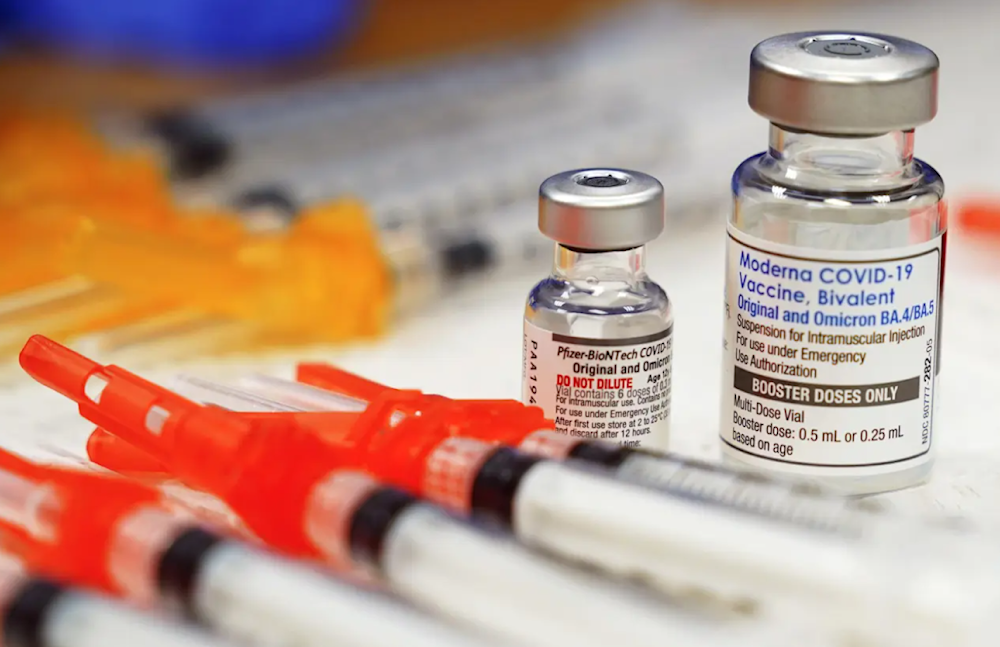Pentagon admits to propaganda campaign against Chinese Covid vaccine
The Pentagon also conceded to having "made some missteps" in its COVID-related messaging
-

Pfizer left, and Moderna COVID-19 vaccines are readied for use at a clinic on November 17, 2022, in Richmond, Virginia (AP)
According to Reuters, the US Department of Defense has discreetly acknowledged to waging a disinformation campaign against China's COVID-19 vaccine in the Philippines during the peak months of the epidemic, citing a document dated June 25.
The report details how back in June, the Pentagon submitted an official letter to the Philippine Departments of Foreign Affairs and National Defense admitting that it had purposefully undermined China's Sinovac vaccination for COVID-19.
According to the document, “It is true that the (Department of Defense) did message Philippines audiences questioning the safety and efficacy of Sinovac."
The Pentagon also conceded to having "made some missteps" in its COVID-related messaging and decided that its anti-vax effort was "misaligned with our priorities," according to the story.
The report also states that the US military "vastly improved oversight and accountability of information operations" since 2022 and "ceased COVID-related messaging related to COVID-19 origins and COVID-19 vaccines in August 2021."
This covert operation involved multiple ways of disseminating anti-vaccine propaganda, particularly targeting China's Sinovac inoculation, like creating numerous fake social media accounts on platforms like X, Facebook, and Instagram. These accounts were used to spread anti-vaccine propaganda, often targeting specific audiences in Southeast Asia and beyond.
The campaign also focused on spreading doubt about the safety and efficacy of Chinese vaccines, such as Sinovac. This included false claims about the presence of pork gelatin in the vaccines, which could be considered forbidden under Islamic law, thus affecting Muslim-majority countries.
The propaganda aimed to intensify fears and anger toward China's vaccines by exploiting existing suspicions and grievances against the country, such as its territorial disputes in the South China Sea.
The campaign also capitalized on existing geopolitical tensions and rivalries between the US and China by leveraging the strained relationship between the US and the Philippines and broader regional dynamics in Southeast Asia to advance US interests and undermine China's influence.
Despite objections from diplomats and warnings from social media companies, the campaign continued until mid-2021.
China's Sinovac hits back at US military campaign discrediting vaccine
Sinovac in June described the campaign by the Pentagon as an attack that will "create enormous disaster," South China Morning Post reported.
Yuan Youwei, a spokesperson for Sinovac, expressed that this stigmatizing will lead to a "lower inoculation rate, the outbreak and spread of disease, social panic and insecurity, as well as crises of confidence in science and public health."
She stated that Sinovac's corporate mission is to create vaccinations capable of eradicating viruses and improving human health.
"Currently we have overcome Covid, but the world is still not in peace," Yuan stated. “Sinovac will continue to help people live good and prosperous lives by preventing disease. We reckon that each profession should focus on their specialties, which is the right attitude.”
Edward Snowden, the American whistleblower famed for uncovering his country's surveillance and intelligence-collecting techniques, stated at the time that the effort "is going to be taught in history classes."
According to Wang Zichen, a research fellow at the Beijing-based Centre for China and Globalisation think tank, the campaign indicates a zero-sum attitude.
Washington considered China's provision of life-saving vaccinations to other poor countries, which had been overlooked by the Trump administration's "America First" policy, as being damaging to US interests, he claimed.
“A more constructive approach should have been for the US to respond to China’s provision of a global public good by contributing more to the Global South in public health and other domains such as infrastructure," citing that there could be "positive outcomes" from competition between both countries.

 4 Min Read
4 Min Read








